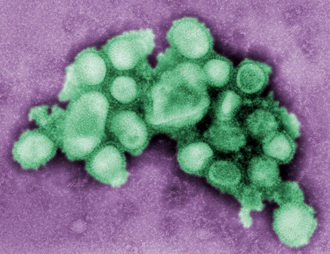Common Sense About the H1N1 Virus
"Fall season is flu season in the United States," says Dr. Maureen Lichtveld, chair of the Tulane Flu Task Force. "In many parts of the country including Louisiana, flu season coincides with allergies, changing weather patterns and the common cold, increasing the risk especially for vulnerable populations."

This 2009 image taken through a microscope shows the H1N1 strain of flu virus. (Centers for Disease Control and Prevention, C. S. Goldsmith and A. Balish)
We may face a new situation this fall, according to Lichtveld, if the seasonal flu occurs together with a recurrence of large H1N1 flu outbreaks. The seasonal flu is different from H1N1, and slightly different virus strains circulate each year. "That's why it is important to get vaccinated on time," she says.
Deanie Stoulig, nurse manager at the Tulane Student Health Center, says that Tulane expects to offer shots for the seasonal flu in September. Seasonal flu shots currently are scheduled to be available to Tulane students, faculty, staff members and their families at the Lavin-Bernick Center on Wednesday, Sept. 16, and Tuesday, Sept. 22, from 10 a.m. until 4 p.m. Additional opportunities to receive a seasonal flu shot will be scheduled for October and November. It is hoped that a vaccine for the H1N1 virus will be available by late October.
Receiving your seasonal flu shot as early as possible is recommended as it takes some time to build immunity.
There are a number of other things everyone can do. "First, we need to stay informed. Reading the Tulane Flu Task Force website is an excellent way to do so," says Lichtveld, professor and chair of environmental health sciences in the School of Public Health and Tropical Medicine. "The site gives information about what we are doing universitywide and provides links to other key sources such as the Centers for Disease Control and Prevention's flu website."
Anyone with flu-related questions also may visit the Tulane Student Health Center flu Web page.
"Second, we need to practice good personal hygiene," Lichtveld adds. "That means washing hands, covering your mouth when you cough, and not touching objects if you have just coughed in your hand, because germs spread that way."
What should you do if you have flu-like symptoms? "If you feel sick and the symptoms are those that you think are the flu, the proper practice is to stay home and contact your physician," says Lichtveld.
The World Health Organization labeled the spring H1N1 influenza outbreak a pandemic. "Classifying it as a pandemic promoted global collaboration and accelerated development of a vaccine," Lichtveld says. "Being proactive is the best way to stay on top of the situation in public health that means preparedness for community protection."
Meanwhile, closer to home, 46 Tulane student-athletes, including 31 members of the football team, have experienced flu-like symptoms. As of Thursday (Aug. 27), 30 of the 31 football players had been cleared by team physician Dr. Greg Stewart to return to action.
